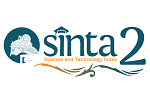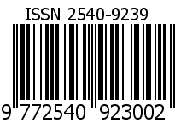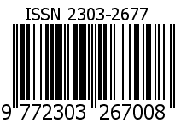The role of selected Indonesian and Philippine Academic Libraries amidst fake news
Abstract
People now have easy access to information on the internet, but people find it difficult to find valid information. Librarians in academic environments have a huge task in helping users receive the correct information. Several university academic libraries in Indonesia and the Philippines play a role in providing insight into false information. This study aimed to describe the information literacy program in several university libraries in Indonesia and the Philippines, selected purposively. The research method used descriptive qualitative research with data collection techniques using questionnaires sent to six libraries from two countries. Based on the study results, six libraries from two countries fought fake news by validating information and checking trusted sources from the academic community. Libraries included the Information Literacy Program in lectures to practice critical thinking skills, used information responsibly, disseminated and preserved information, primarily through social media. Academic libraries applied various strategies and methods to teach information literacy to students through fun and engaging lectures, seminars, workshops, and interactive games. Libraries establish communication with librarians, students, lecturers, and universities. Indonesian and Philippine academic libraries effectively use the Information Literacy Program to educate, protect against access and dissemination of false information. The study results can be used as additional literature in information literacy in both ASEAN countries and the movement to eradicate fake news worldwide.
Keywords
Full Text:
PDFReferences
Abad, D. J. V. (2020). Designing a contextualized and culture-based reading material for indigenous learners. Palarch’s Journal of Archaeology of Egypt / Egyptology, 17(1), 153–163. https://archives.palarch.nl/index.php/jae/article/view/1024/1017
Aldwairi, M., & Alwahedi, A. (2018). Detecting fake news in social media networks. Procedia Computer Science, 141(18), 215–222. https://doi.org/10.1016/j.procs.2018.10.171
Anderson, R. (2017). Fake news and alternative facts: Five challenges for academic libraries. Insights, 30(2), 4–9. https://doi.org/10.1629/uksg.356
Association of college & Research Libraries (ACRL). (2019). Characteristics of programs of information literacy that illustrate best practices: A guideline. Association of College & Research Libraries (ACRL). Retrieved October 01, 2020, from https://www.ala.org/acrl/standards/characteristics
Bertot, J. C., Jaeger, P. T., & Hansen, D. (2012). The impact of polices on government social media usage: Issues, challenges, and recommendations. Government Information Quarterly, 29(1), 30–40. https://doi.org/10.1016/j.giq.2011.04.004
Buenrostro, I. S., & Cabbab, J. F. A. (2017). Persistent resistance: Libraries in the Philippines and their fight for freedom and people’s rights. WLIC 2017 IFLA World Library and Information Congress 83rd IFLA General Conference and Assembly, 1–8. Retrieved from http://library.ifla.org/id/eprint/1613/
Calvin, A. J., Bellmore, A., Xu, J., & Zhu, X. (2015). #bully: Uses of Hashtags in Posts About Bullying on Twitter. Journal of School Violence, 14(1), 133–153. https://doi.org/10.1080/15388220.2014.966828
Chen, K., & Lin, P. (2011). Information literacy in university library user education. Aslib Proceedings, 63(4), 399–418. https://doi.org/10.1108/00012531111148967
Chen, M. (2018). Students’ perceptions of the educational usage of a Facebook group. Journal of Teaching in Travel & Tourism, 18(4), 332–348. https://doi.org/10.1080/15313220.2018.1434448
Cooke, N. A. (2017). Posttruth, truthiness, and alternative facts: Information behavior and critical information consumption for a new age. The Library Quarterly, 87(3), 211–221. https://doi.org/10.1086/711636
David, L. T., & Kim, A. S. K. (2012). Increasing awareness and use of the library’s resources and facilities through relationship marketing strategies. Library Management, 33(4/5), 292–296. https://doi.org/10.1108/01435121211242326
De La Salle University. (2017). Libraries. De La Salle University. Retrieved September 01, 2020, from https://www.dlsu.edu.ph/library/
De Paor, S., & Heravi, B. (2020). Information literacy and fake news: How the field of librarianship can help combat the epidemic of fake news. The Journal of Academic Librarianship, 46(5), 1–8. https://doi.org/10.1016/j.acalib.2020.102218
Donelan, H. (2016). Social media for professional development and networking opportunities in academia. Journal of Further and Higher Education, 40(5), 706–729. https://doi.org/10.1080/0309877X.2015.1014321
Fernandez, P. (2017). The technology behind fake news. Library Hi Tech News, 34(7), 1–5. https://doi.org/10.1108/LHTN-07-2017-0054
Gretter, S., & Yadav, A. (2016). Computational thinking and media & information literacy: An Integrated approach to teaching twenty-first century skills. TechTrends, 60(5), 510–516. https://doi.org/10.1007/s11528-016-0098-4
Hattwig, D., Bussert, K., Medaille, A., & Burgess, J. (2013). Visual literacy standards in higher education: New opportunities for libraries and student learning. Portal: Libraries and the Academy, 13(1), 61–89. https://doi.org/10.1353/pla.2013.0008
Indyer, K. (2014). The need for introducing media education in our school curriculum. UNAOC. Retrieved September 01, 2020, from https://milunesco.unaoc.org/mil-articles/the-need-for-introducing-media-education-in-our-school-curriculum/
Joshua, D. (2014). Users’ assessment of e-resources at the University Library of the University of the Philippines, Diliman. Journal of Philippine Librarianship, 34(1), 1–13. https://journals.upd.edu.ph/index.php/jpl/article/view/4582/4127
Levickaite, R. (2010). Generations x, y, z: How social networks form the concept of the world without borders (the case of Lithuania). LIMES: Cultural Regionalistics, 3(2), 170–183. https://doi.org/10.3846/limes.2010.17
Lim, S. (2020). Academic library guides for tackling fake news: A content analysis. The Journal of Academic Librarianship, 46(5), 1–11. https://doi.org/10.1016/j.acalib.2020.102195
Luo, L. (2012). Professional preparation for “Text a Librarian”: What are the requisite competencies? RUSA: Reference and User, 52(1), 44–52. https://doi.org/10.5860/rusq.52n1.44
Moselen, C., & Wang, L. (2014). Integrating Information Literacy into Academic Curricula: A Professional Development Programme for Librarians at the University of Auckland. The Journal of Academic Librarianship, 40(2), 116–123. https://doi.org/10.1016/j.acalib.2014.02.002
Nelisa, M., & Ardoni. (2017). The information literacy model of library users in supporting tridharma. Proceedings of the Sixth International Conference on Languages and Arts (ICLA 2017), 349–354. Retrieved from https://www.atlantis-press.com/proceedings/icla-17/25888956
Pitoyo, A. (2020). A Meta-analysis: Factors affecting students’reading interest in Indonesia. International Journal of Multicultural and Multireligious Understanding, 7(7), 83–92. https://doi.org/10.18415/ijmmu.v7i7.1727
Poedjiastutie, D. (2018). Indonesian school students reading habits: A Sociocultural perspectives. International Journal of English Language and Literature Studies, 7(4), 94–100. https://doi.org/10.18488/journal.23.2018.74.94.100
Ramdhani, S., Istiqomah, E. N., & Ardiyanti, G. K. (2012). The history of Yogyakarta, an education city. International Proceedings of Economics Development and Research, 21–24. Retrieved from http://www.ipedr.com/vol58/005-ICHCS2012-S00017.pdf
Rochlin, N. (2017). Fake news: Belief in post-truth. Library Hi Tech, 35(3), 386–392. https://doi.org/10.1108/LHT-03-2017-0062
Sadiku, M. N. O., Eze, T. P., & Musa, S. M. (2018). Fake news and misinformation. International Journal of Advances in Scientific Research and Engineering (Ijasre), 4(5), 187–190. https://doi.org/10.7324/IJASRE.2018.32728
Samsuddin, S. F., Shaffril, H. A. M., Bolong, J., & Mohamed, N. A. (2019). Understanding the reading habit and attitudes among the rural community in low literacy rate areas in Malaysia: Rural library perspectives. Library Management, 41(1), 39–52. https://doi.org/10.1108/LM-06-2019-0037
Santia, G. C., & Williams, J. R. (2018). BuzzFace: A News veracity dataset with Facebook user commentary and egos. Proceedings of the Twelfth International AAAI Conference on Web and Social Media (ICWSM 2018), 531–540. Retrieved from https://aaai.org/ocs/index.php/ICWSM/ICWSM18/paper/view/17825
Stein-Smith, K. (2017, March). Librarians, information literacy, and fake news. Strategis Library, 1–4. https://www.libraryspot.net/SL/SL_Mar17_1.pdf
UNESCO Institute. (2021). Media and information literacy. UNESCO Institute for Information Technologies in Education. Retrieved September 01, 2020, from https://iite.unesco.org/mil/
Uzohue, C. E., & Yaya, J. A. (2016). The use of internet by information professionals: A competitive intelligence approach. International Journal of Education and Information Technology, 2(4), 19–27. http://www.aiscience.org/journal/paperInfo/ijeit?paperId=2873
Wasike, J. (2013). Social media ethical issues: Role of a librarian. Library Hi Tech News, 30(1), 8–16. https://doi.org/10.1108/07419051311320922
Wegmann, E., Stodt, B., & Brand, M. (2015). Addictive use of social networking sites can be explained by the interaction of Internet use expectancies, Internet literacy, and psychopathological symptoms. Journal of Behavioral Addictions, 4(3), 155–162. https://doi.org/10.1556/2006.4.2015.021
Weiner, S. A. (2012). Institutionalizing information literacy. The Journal of Academic Librarianship, 38(5), 287–293. https://doi.org/10.1016/j.acalib.2012.05.004
Yap, J. M., & Penaflor, J. (2020). The amazing library race: Developing students’ media and information literacy skills through games. Journal of Information Literacy, 14(1), 66–82. https://doi.org/10.11645/14.1.2708
DOI: https://doi.org/10.24198/jkip.v9i2.30014
Refbacks
- There are currently no refbacks.
Copyright (c) 2021 Jurnal Kajian Informasi & Perpustakaan

This work is licensed under a Creative Commons Attribution-ShareAlike 4.0 International License.
Jurnal Kajian Informasi & Perpustakaan Indexed by:
Jurnal Kajian Informasi & Perpustakaan
Program Studi Perpustakaan dan Sains Informasi d.h. Program Studi Ilmu Perpustakaan
Fakultas Ilmu Komunikasi, Universitas Padjadjaran
Jl. Raya Bandung-Sumedang Km. 21 Jatinangor, Sumedang, Indonesia 45363
WA: +62 813-1323-7581 (Chat Only)
Telepon: +62227796954
Faksimile: +62227794122
email: jkip.fikom@unpad.ac.id
Jurnal Kajian Informasi & Perpustakaan is licensed under a Creative Commons Attribution-ShareAlike 4.0 International License
Jurnal Kajian Informasi & Perpustakaan supervised by:












2.png)
.png)



